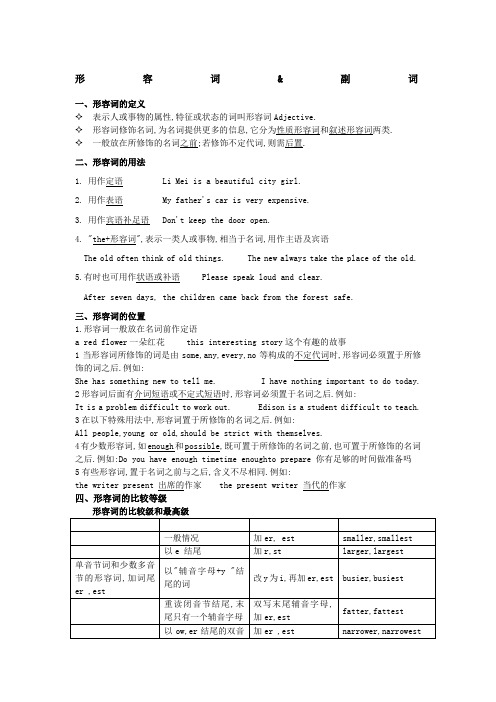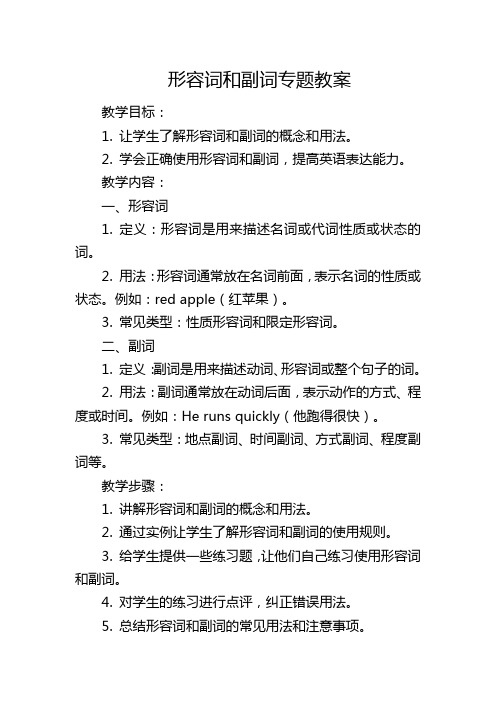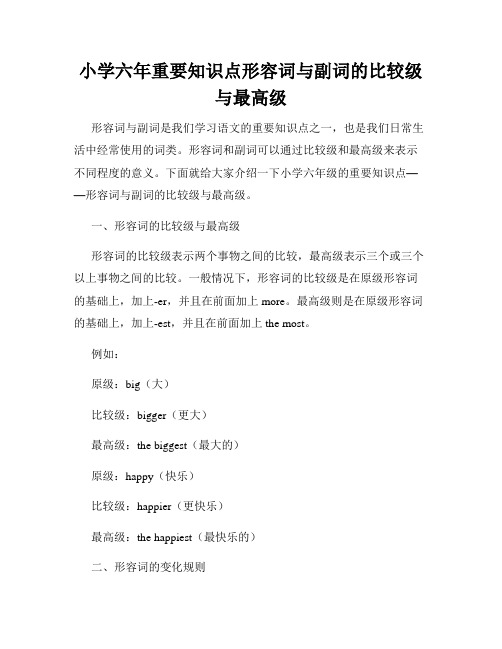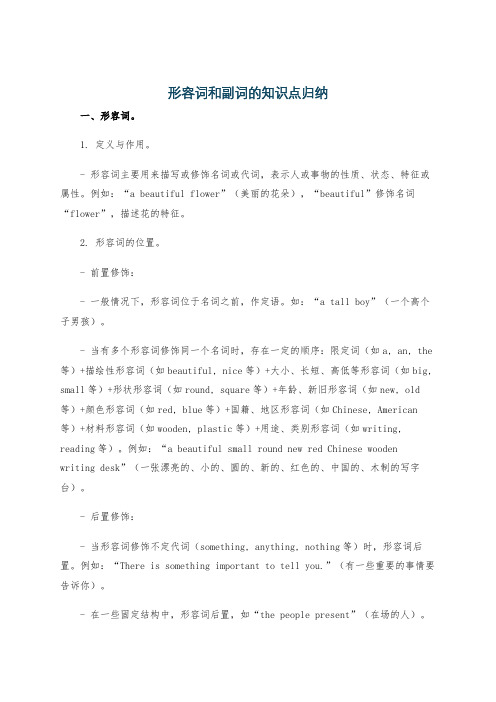小学形容词副词讲解
小学英语重点知识归纳 形容词 副词 介词 数词

小学英语重点 知识归纳( 知识归纳(3)
一、 形容词、副词
一般来说,中文意思是“ 一般来说,中文意思是“……的”的词是形容 的 而中文意思是“ 词,而中文意思是“……地”的词是副词。 地 的词是副词。
一、形容词概念
形容词是用来修饰物体的形状,大小,长度,属性,特点 等,位于名词的前面。如: 1.He is a hard-working student. (努力的→特点) 2.Our English teacher has long hair. (长的→长度) 3.The elephants are very big, and the mice are very small. (大的、小的→大小)
• 3、表示时间的介词有:at, on, in。 表示时间的介词有: 表示时间的介词有 。 • (1)at表示“在某一个具体的时间点上”,或用在固 表示“ ) 表示 在某一个具体的时间点上” 定词组中。 定词组中 at ten o’clock, at 9:30 a.m., at night, at the weekend • (2)on表示“在某日或某日的时间段”。 表示“ ) 表示 在某日或某日的时间段” on Friday, on the first of October, on Monday morning • (3)in表示“在某一段时间(月份、季节)里” 表示“ ) 表示 在某一段时间(月份、季节) in the afternoon, in September, in summer, in 2005…
补充
序数词
one two three four five six seven eight nine ten
几
eleven twelve thirteen fourteen fifteen sixteen seventeen eighteen nineteen
形容词与副词讲解加练习

形容词&副词一、形容词的定义✧表示人或事物的属性,特征或状态的词叫形容词Adjective.✧形容词修饰名词,为名词提供更多的信息,它分为性质形容词和叙述形容词两类.✧一般放在所修饰的名词之前;若修饰不定代词,则需后置.二、形容词的用法1. 用作定语 Li Mei is a beautiful city girl.2. 用作表语 My father's car is very expensive.3. 用作宾语补足语 Don't keep the door open.4. "the+形容词",表示一类人或事物,相当于名词,用作主语及宾语The old often think of old things. The new always take the place of the old.5.有时也可用作状语或补语 Please speak loud and clear.After seven days, the children came back from the forest safe.三、形容词的位置1.形容词一般放在名词前作定语a red flower一朵红花 this interesting story这个有趣的故事1当形容词所修饰的词是由some,any,every,no等构成的不定代词时,形容词必须置于所修饰的词之后.例如:She has something new to tell me. I have nothing important to do today. 2形容词后面有介词短语或不定式短语时,形容词必须置于名词之后.例如:It is a problem difficult to work out. Edison is a student difficult to teach. 3在以下特殊用法中,形容词置于所修饰的名词之后.例如:All people,young or old,should be strict with themselves.4有少数形容词,如enough和possible,既可置于所修饰的名词之前,也可置于所修饰的名词之后.例如:Do you have enough timetime enoughto prepare 你有足够的时间做准备吗5有些形容词,置于名词之前与之后,含义不尽相同.例如:the writer present 出席的作家 the present writer 当代的作家四、形容词的比较等级副词的比较级和最高级1.大多数以ly结尾的副词前加more 和most 来构成比较级和最高级;2.少数单音节副词,加er,est 构成其比较级和最高级 ;3. 几个特殊的形容词和副词1 句型"as…as",表示两者相比较,程度相同.The old man walks as fast as a young man.2 句型"not asso…as",表示两者相比较,前者不如后者.I'm not as tall as Jack. 我没有杰克高.3 表示两者之间比较时,用"形容词比较级+than"或"less…than"两种句型.Your mother looks healthier than before.4 more and more… 越来越…….The park is getting more and more beautiful.5 the 比较级…the比较级… 越……就越…….The more books we read, the cleverer we will become.6 "the+比较级+of the two…"两个中较……的一个.I'd like to go to the farther of the two places.7 "比较级+than any other+单数名词"比其他任何……都…….Li Lei is taller than any other boy in his class.8 三者或三者以上相比较,用"the+最高级+名词+范围"结构.This is the cleanest place of the city.9 表示"最……之一",用"one of the+形容词最高级+复数名词".The Great Wall of China is one of the greatest buildings in the world.注意: 形容词最高级前面必须加定冠词the,但当形容词最高级前面有物主代词修饰时,则不加the.例如:正This is my best friend.误 This is my thethe my best friend.五、几种常见的形容词句型1.形容词+介词+名词或代词或动名词I'm not interested in playing computer games.My parents are pleased with my studies.2.It iswas+形容词+of/for+名词或代词+不定式It's foolish of me to make such a mistake.It was kind of the driver to send the old man home.3.形容词+不定式常用于这种句型的形容词有:able,sure,lucky,ready,happy,likely等. She is sure to pass the exam. I'm lucky to meet you here.副词的用法1. 副词修饰动词,在句子中作方式状语;例如:The man runs fast. fast修饰runs这个动作2. 副词修饰形容词,并且通常放在形容词的前面例如:He becomes very handsome.3. 在“副词+形容词”这样的结构中,中心词是形容词,副词只是为了说明程度大小即:very handsome的中心词是handsome4. 副词前面也可以加副词,例如上面的句子都可以改写成:The man runs very fast.very本身是副词,意思是“非常,很”,所以后面也可以跟副词或者形容词;❖填形容词还是副词实义动词后面跟副词,连系动词后面跟形容词;例如:She sings beautifully. sing是实义动词,beautiful用来说明唱得如何She looks sad. look是连系动词,后面跟形容词还有一些不是连系动词的词,例如make和get,要根据句子的意思判断填形容词还是副词;区分:He is making a kite carefully.carefully用来修饰make这个动词He made the teacher angry.angry是指the teacher,而不是修饰make这个动词于是有词组:make sb+adj. leave sb+adj. get+adj❖形容词和副词分别长什么样子1.形容词的词尾通常有ing/ful/ed/yinteresting、tiring、boring、exciting、surprising、amazing与物有关interested、tired、bored、excited、surprised、amazed与人有关careful、hopeful、wonderful、helpful、colorful、meaningful、beautiful rainy、windy、cloudy、dry、messy、easy、funny、busy、angry区分:The children were excited when they heard the exciting news.The man was tired劳累的 after doing so many tiring累人的 jobs.但是在interesting与interested中,形容人或物的都用interesting,而interested 常以词组be interested in的形式出现,表示“对…感兴趣”;The story is interesting./The teacher is interesting.2.副词的词尾通常是ly,但亦有一些不以ly结尾的副词;badly、surprisingly、carefully、hopefully、quickly、greatly、possibly通常是由形容词加ly变来hard努力地、well好、high高、fast快地、pretty十分,非常、very much/a lot 非常a little一点3.有些词既是形容词也是副词hard adj.硬的 adv.努力地 early adj.早的 adv.早地 late adj.迟的adv.迟high adj.&adv. 高 well adj.健康地 adv.好形容词比较级练习题一写出下列形容词与副词的比较级与最高级形式:long wide fatheavy slow fewbrightly badly farquickly happy unhappy 二用所给词的正确形式填空:1. Of the two girls, I find Lucy the clever.2. Gold黄金 is little useful than iron铁.3. My sister is two years old than I.4. John’s parents have four daughters, and she is the young child.5. The cheap bags are the not usually the best ones.6. The short one is by far expensive of the five.7. The boy is not so interesting as his brother.8. Dick sings well, she sings well than John, but Mary singswell in her class.9. She will be much happy in her mew house.10. This dress is than that one.expensive三翻译句子:1.这本书跟那本书一样有趣;This book is _____ _____ that one.2.你游泳没有你弟弟好;You can’t swim _____ _____ your brother.3.今天比昨天冷的多;It is today ______ it was yesterday. 4.这个故事比另一个有趣得多;This story is _____ ______ than that one. 5.他比我大两岁;He is _____ ______ than I.6.这个故事不如那个有趣;This story is _____ _____ than that one. 7.她的身体状况一天天好起来;She is getting ______ every day.8.他对英语越来越感兴趣;He is becoming ______ _____ _______ _____ English.9.他吃的越多,人越胖;The more he eats, the _______ he gets.10.你的问题是两个中比较难的那个;Your question is _______ ______ of two.副词练习一、将形容词变为副词1.easy2.hard3.true4.heavy5.careful6.happy7.fast 8.lucky 9.gentle10.possible 11.angry 12.sad13.good 14.bad 15.near16.terrible17.quick 18.nice二、用单词适当形式填空1. Look at the children on the playground. They are flying kites ________happy.2. Why do you think you did so ___________badin your test3. We can __________easy forgive a child who is afraid of the dark, but we can’t forgive an adult who is afraid of the light.4. Congratulations You’ve answered all the questions _________correct.5. The computer is wideused in our daily life. We can do many things with it.6. I changed into my sports shoes so that I could walk more ____________comfortable.7. Mary passed her examination because she studied very ________hard.8. “Why didn’t you tell me earlier ” The boss shouted _______hungry.9. It’s true possible that robot teachers will be popular in schools some day.10. How _________comfortable the giant pandas are living in Taiwan11. Miss Xu smiled and said to me ________soft, “Never mind, my boy”12. Last night it rained __________heavy in the southern part of the city.13. Simon hates to be like others, he often tires to do everything different.14. The children clapped their hands _________excited as soon as the astronauts appearedon the stage.15. Tom had an accident yesterday. His teacher sent him to the hospital quick.形容词与副词专项训练练习题1. Work gets done ________ when people do it together, and the rewards are higher too.A. easilyB. very easyC. more easilyD. easier2. My parents have always made me ________ about myself, even when I was twelve.A. feeling wellB. feeling goodC. feel wellD. feel good3. He began to take political science ________ only when he left school.A. strictlyB. trulyC. carefullyD. seriously4. The final score of the basketball match was 93-94. We were only ________ beaten.A. nearlyB. slightlyC. narrowlyD. lightly5. The new group of students is better-behaved than the other group who stayed here ________.A. earlyB. earlierC. earliestD. the earliest6. —Do you need any help, Lucy —Yes, The job is ________ I could do myself.A. less thanB. more thanC. no more thanD. not more than7. There is an old proverb, ―Love me, love my dog. But there is ________ wisdomin this: ―Love me, love my book.A. someB. muchC. moreD. most8. With April 18’s railway speedup, highway and air transport will have to compete with ________ service for passengers.A. goodB. betterC. bestD. the best9. The melon the Smiths served at dinner would have tasted ________ if it had been put in the fridge for a little while.A. goodB. betterC. bestD. well10. After two years’ research, we now have a ________ better understanding of the disease.A. veryB. farC. fairlyD. quite11. Speaking of all the songs he has written, I think this is probably his ________ one.A. better-knownB. well-knownC. best-knownD. most-known12. Of the two coats, I’d choose the ________ one to spare some money for a book.A. cheapestB. cheaperC. more expensiveD. most expensive13. —I wonder why Mary is so unfriendly to us.—She is ________ than unfriendly, I’m afraid.A. shyerB. much shyerC. shy moreD. more shy14. —I didn’t do well in this English examination. How about you—I did ________ you.A. not better thanB. no worse thanC. as well asD. no better than15. —Now that you like the house with a garden, why not buy it—Well, I can’t afford ________ house at present.A. that expensive aB. a such expensiveC. that an expensiveD. a so expensive用所给词的适当形式填空1.The river was so polluted that it _________actual caught fire and burned.2.Bend your knees slightly and reach out your arms like tree branches, naturally and _______ soft.3.Just be ______________ patience.4.Although parents should take _________ well care of their young children, they don’t ______________ necessary do anything for them.5.---Do you like Mary’s new hairstyle---Perfect How much ________ good she looks with the curly short hair6.--- Are you satisfied with the result of the exam--- Not at all. I can’t have a ________ bad one.7.--- Lily did succeed at last--- Yeah, indeed, but she was _______________ luck than successful, I think.8.That would be a very _________ reason thing to do in a big city, but it could destroy a small village like this.9.Mary felt __________ please, because there were many empty seats in the room.10. The teachers are very enthusiastic and __________ friend and the classrooms are _____________ amaze.单句改错只有一处错误1.The fruits are small in size, but juicy and taste.2.We don’t need to do so many homework. Therefore, we have more time for after-school activities.3.The teachers here are kind and helpfully. They are not only our teachers but also our friends.4. That is too much for us, considering how closely the houses are.5.I’m always caution about what I say because some careless remarks are likely to hurt other’s feelings.6.Doing physical exercise is an effect way to get rid of anger.7.But such a small thing couldn’t possible destroy a village.8.Interesting, it has a connection with the British porcelain 瓷器 industry.1. C;根据题意可知,说话者是将when people do it together和when people don’t do it together这两种情况比较,故选比较级;注意不要选D,因为在此题是要用副词修饰动词,不能用形容词;另外,根据句末的higher too也可知道此题是考查比较级;2. D;首先,根据连系动词后要接形容词作表语这一特点,可排除A和C;另外,使役动词make后可接动词原形不带to的不定式或过去分词作宾语补足语,但不能接现在分词,故可排除选项B;3. D;take sth seriously的意思是“认真对待某事”“认真考虑某事”;4. C;副词narrowly 在此表示“勉强地”,又如:He narrowly escaped being run over. 他差点儿被车压死; The proposal to change the rules was narrowly defeated by 201 votes to 196. 建议改变规则的提议以196票对201票的微弱差额被否决了;本题句意:篮球赛的最后比分是93比94;我们以微弱的劣势输掉了比赛;5. B;因题目把这组新学生与前面一组学生进行比较,故用比较级;6. B;注意句中的Yes,由于答话者对问话者的“你需要帮助吗”作了肯定回答,说明答话者独自完成工作有困难,故填more than;7. C;由于是将“Love me, love my dog”与“Love me, love my book”进行比较,故用比较级;此题的巧妙之处在于句中没有出现than,而是给出两个待比较的proverb; 8. B;句子大意为:由于铁路提速了,所以高速公路和航空业要提高服务质量来竞争客源;因将“高速公路和航空”与“铁路”比较,故用比较级; 9. B;题目中将“放入冰箱中冷冻”与“不放入冰箱中冷冻”作比较,故用比较级;句意为:史密斯家人晚餐时上的甜瓜若能放入冰箱中冷冻一下味道会更好些; 10. B;这四个副词中,通常只有far可用于修饰比较;注:quite有时也可用于修饰比较better,但它只用于表示“身体康复”,不用于其他意义; 11. C;因为是从他所写的所有歌中选出一首来比较,故用最高级from .hxen; 12. B;因是两者比较,故用比较级,可将答案锁定在B和C之间;再根据句意,排除C; 13. D;此题考查more…than…的用法,其意为“与其说……不如说……”; 14. D;句中的no better than相当于as badly as,其意为“一样不好”; 15.A;that在用作副词,用法相当于so,意为“如此,这么”;Ⅰ 1. actually 2. softly 3. patient 4. good, necessarily 5. better 6. worse 7. more lucky 8. reasonable 9. pleased 10. friendly, amazingⅡ1. taste---tasty 2. many----much 3. helpfully---helpful 4. closely --- close 5. caution---cautious6. effect---effective7. possible ---possibly8. Interesting---Interestingly9. more---manylonger longest wider widest fatter fattestheavier heaviest slow slower slowest fewer fewestmore brightly most brightly more badly most badlyfarther farthest more quickly most quickly happier happiest unhappier unhappiest二用所给词的正确形式填空:1. cleverer2.less3.older4.youngest5.cheapest6.more7.interesting8.well,better ,best 9. Happier 10. more expensive三翻译句子:1. as interesting as2. As well as3.much colder today than4. Much more interesting 5.two years older 6. Not more interesting 7. Getting better and better 8.more and more interested in 9. Fatter10. The more difficult形容词&副词一、形容词的定义✧表示人或事物的属性,特征或状态的词叫形容词Adjective.✧形容词修饰名词,为名词提供更多的信息,它分为性质形容词和叙述形容词两类.✧一般放在所修饰的名词之前;若修饰不定代词,则需后置.二、形容词的用法1. 用作 Li Mei is a beautiful city girl.2. 用作 My father's car is very expensive.3. 用作 Don't keep the door open.4. " ",表示一类人或事物,相当于名词,用作主语及宾语The old often think of old things. The new always take the place of the old.5.有时也可用作 Please speak loud and clear.After seven days, the children came back from the forest safe.三、形容词的位置1.形容词一般放在名词前作定语a red flower一朵红花 this interesting story这个有趣的故事1当形容词所修饰的词是由some,any,every,no等构成的时,形容词必须置于所修饰的词之后.例如:She has something new to tell me. I have nothing important to do today. 2形容词后面有介词短语或不定式短语时,形容词必须置于名词之后.例如:It is a problem difficult to work out. Edison is a student difficult to teach. 3在以下特殊用法中,形容词置于所修饰的名词之后.例如:All people,young or old,should be strict with themselves.4有少数形容词,如和 ,既可置于所修饰的名词之前,也可置于所修饰的名词之后.例如:Do you have enough timetime enoughto prepare 你有足够的时间做准备吗5有些形容词,置于名词之前与之后,含义不尽相同.例如:the writer present 的作家 the present writer 的作家四、形容词的比较等级☆副词的比较级和最高级1.大多数以ly结尾的副词前加和来构成比较级和最高级;2.少数单音节副词,加er,est 构成其比较级和最高级 ;比较级和最高级的常用句型1 句型" ",表示两者相比较,程度相同.The old man walks as fast as a young man.2 句型" ",表示两者相比较,前者不如后者.I'm not as tall as Jack. 我没有杰克高.3 表示两者之间比较时,用" "或" "两种句型.Your mother looks healthier than before.4 越来越…….The park is getting more and more beautiful.5 越……就越…….The more books we read, the cleverer we will become.6 " "两个中较……的一个.I'd like to go to the farther of the two places.7 " "比其他任何……都…….Li Lei is taller than any other boy in his class.8 三者或三者以上相比较,用" "结构.This is the cleanest place of the city.9 表示"最……之一",用" ".The Great Wall of China is one of the greatest buildings in the world.注意: 形容词最高级前面必须加定冠词the,但当形容词最高级前面有物主代词修饰时,则不加the.例如:正This is my best friend.误 This is my thethe my best friend.五、几种常见的形容词句型1.I'm not interested in playing computer games.My parents are pleased with my studies.2.It's foolish of me to make such a mistake.It was kind of the driver to send the old man home.3.常用于这种句型的形容词有:able,sure,lucky,ready,happy,likely等.She is sure to pass the exam. I'm lucky to meet you here.☆☆副词的用法1. 副词修饰 ,在句子中作方式状语;例如:The man runs fast. fast修饰runs这个动作2. 副词修饰 ,并且通常放在形容词的前面例如:He becomes very handsome.3. 在“副词+形容词”这样的结构中,中心词是形容词,副词只是为了说明程度大小即:very handsome的中心词是handsome4. 副词前面也可以加 ,例如上面的句子都可以改写成:The man runs very fast.very本身是副词,意思是“非常,很”,所以后面也可以跟副词或者形容词;❖填形容词还是副词实义动词后面跟 ,连系动词后面跟 ;例如:She sings beautifully. sing是实义动词,beautiful用来说明唱得如何She looks sad. look是连系动词,后面跟形容词还有一些不是连系动词的词,例如make和get,要根据句子的意思判断填形容词还是副词;区分:He is making a kite carefully/ careful.He made the teacher angry/ angrily于是有词组:make sb+adj. leave sb+adj. get+adj❖形容词和副词分别长什么样子1. 形容词的词尾通常有interesting、tiring、boring、exciting、surprising、amazing与物有关interested、tired、bored、excited、surprised、amazed与人有关careful、hopeful、wonderful、helpful、colorful、meaningful、beautifulrainy、windy、cloudy、dry、messy、easy、funny、busy、angry区分:The children were excited when they heard the exciting news.The man was tired/ tiring 劳累的 after doing so many tired/ tiring累人的 jobs.✧但是在interesting与interested中,形容人或物的都用interesting✧而interested常以词组be interested 的形式出现,表示“对…感兴趣”;The story is interesting./The teacher is interesting.2. 副词的词尾通常是ly,但亦有一些不以ly结尾的副词;努力地、好、高、快地、十分,非常、一点4.有些词既是形容词也是副词adj.硬的 adv.努力地 adj.早的 adv.早地 adj.迟的adv.迟adj.&adv. 高 adj.健康地 adv.好。
小学英语语法知识详解之形容词与副词

小学英语语法知识详解之形容词与副词1. 形容词作定语,修饰名词或代词(1)形容词修饰名词,一般放在名词的前面。
例如:yellow desks, an interesting film.(2)如果形容词修饰以-thing/-body 等为词尾的复合不定代词时,要放在这些词之后。
如:something nice, nothing important 等。
2.形容词是谓语,位于系动词后面。
比如Tom looks very happy now. 汤姆现在看起来很开心。
The food tastes delicious. 这些食物尝起来很美味。
The weather is getting warmer and warmer. 天气变得越来越暖和了。
常见的系动词有:be, look, sound, smell, taste, feel, keep, get, turn, bee(表变化)等。
接下来看看什么是副词:副词(adverb,简写为 adv),是一种用来修饰行为动词、形容词、副词或整个句子的词,说明时间、地点、程度、方式等概念的词。
例如:well, badly, carefully, slowly 等。
(对于什么是副词,也同样是运用跟汉语相联系的办法,前面说形容词就是带“的”的词,那么副词就是带“地”或者“得”的词了,我们知道在汉语中带“地”的词后面都是接动词,也就意味着英语中汉语解释带“地”的词也是用来修饰动词的,这样既可以很好的理解什么是副词也能顺便把副词的基本用法了解了,一举两得。
对于带“得”的词,在汉语中一般是接形容词的,比如说:开心得不得了,可以看得出“开心”是形容词,而“不得了”是修饰开心的程度的,于是中文含义带有“得”的词就是副词,且是用来修饰形容词或者副词的程度的)副词的分类方式副词: 表示动作和状态的进行和存在方式、方法,如:carefully, suddenly, fast, well, politely,但friendly lovely, lonely, lively elderly, ugly 为形容词程度副词: 多用来修饰形容词和副词,如:very ,much,enough,almost,rather,so,too,still,quite地点副词:here ,there ,everywhere, anywhere, home, upstairs, downstairs 等时间副词:tomorrow, now, today, then, yesterday, tonight 等频度副词:always,usually,often,never,sometimes,seldom,once,rarely,hardly 等疑问副词:why, when, where, how(引导特殊疑问句) how often, how long ,how soon, how much, how many 等关系副词:when, where, why (用于定语从句)其他also,either,too,only,perhaps(对于疑问副词和关系副词,小学不用做要求,认识就行!)接下来看看副词的基本用法:(1)修改行为动词以显示动作是如何执行的。
形容词和副词专题教案

形容词和副词专题教案教学目标:1. 让学生了解形容词和副词的概念和用法。
2. 学会正确使用形容词和副词,提高英语表达能力。
教学内容:一、形容词1. 定义:形容词是用来描述名词或代词性质或状态的词。
2. 用法:形容词通常放在名词前面,表示名词的性质或状态。
例如:red apple(红苹果)。
3. 常见类型:性质形容词和限定形容词。
二、副词1. 定义:副词是用来描述动词、形容词或整个句子的词。
2. 用法:副词通常放在动词后面,表示动作的方式、程度或时间。
例如:He runs quickly(他跑得很快)。
3. 常见类型:地点副词、时间副词、方式副词、程度副词等。
教学步骤:1. 讲解形容词和副词的概念和用法。
2. 通过实例让学生了解形容词和副词的使用规则。
3. 给学生提供一些练习题,让他们自己练习使用形容词和副词。
4. 对学生的练习进行点评,纠正错误用法。
5. 总结形容词和副词的常见用法和注意事项。
教学难点与重点:1. 难点:让学生掌握形容词和副词的正确用法,避免出现语法错误。
2. 重点:讲解形容词和副词的类型和常见用法。
教具和多媒体资源:1. 黑板或白板。
2. 投影仪或PPT。
3. 实例句子和练习题。
评价与反馈:1. 评价方式:通过学生的练习和课堂表现进行评价。
2. 为学生提供反馈,指出他们在使用形容词和副词时需要注意的问题,并给出改进建议。
3. 鼓励学生互相交流和学习,共同提高英语表达能力。
作业布置:1. 收集一些包含形容词和副词的句子,并标注出形容词和副词。
2. 自己编写一些包含形容词和副词的句子,并尽量使用不同的类型。
3. 对于不理解的句子或用法,及时向老师或同学请教。
小学六年重要知识点形容词与副词的比较级与最高级

小学六年重要知识点形容词与副词的比较级与最高级形容词与副词是我们学习语文的重要知识点之一,也是我们日常生活中经常使用的词类。
形容词和副词可以通过比较级和最高级来表示不同程度的意义。
下面就给大家介绍一下小学六年级的重要知识点——形容词与副词的比较级与最高级。
一、形容词的比较级与最高级形容词的比较级表示两个事物之间的比较,最高级表示三个或三个以上事物之间的比较。
一般情况下,形容词的比较级是在原级形容词的基础上,加上-er,并且在前面加上more。
最高级则是在原级形容词的基础上,加上-est,并且在前面加上the most。
例如:原级:big(大)比较级:bigger(更大)最高级:the biggest(最大的)原级:happy(快乐)比较级:happier(更快乐)最高级:the happiest(最快乐的)二、形容词的变化规则1. 以辅音字母+y结尾的形容词,将y变为i,再加-er或-est。
例如:原级:happy(高兴的)比较级:happier(更高兴的)最高级:the happiest(最高兴的)2. 以重读闭音节结尾的形容词,双写最后一个辅音字母,再加-er或-est。
例如:原级:big(大的)比较级:bigger(更大的)最高级:the biggest(最大的)3. 以-e结尾的形容词,直接加-r或-st。
例如:原级:nice(好的)比较级:nicer(更好的)最高级:the nicest(最好的)三、副词的比较级与最高级副词的比较级和最高级的形式与形容词的变化规则相似。
一般情况下,在副词前面加上more来表示比较级,在副词前面加上the most来表示最高级。
例如:原级:quickly(快速地)比较级:more quickly(更快速地)最高级:the most quickly(最快速地)四、特殊形式的变化1.一些形容词的比较级和最高级形式是不规则的,需要特殊记忆。
例如:原级:good(好的)比较级:better(更好的)最高级:the best(最好的)原级:bad(坏的)比较级:worse(更坏的)最高级:the worst(最坏的)2. 有些形容词和副词的比较级和最高级形式与原级完全不同,需要特殊记忆。
形容词和副词的知识点归纳

形容词和副词的知识点归纳一、形容词。
1. 定义与作用。
- 形容词主要用来描写或修饰名词或代词,表示人或事物的性质、状态、特征或属性。
例如:“a beautiful flower”(美丽的花朵),“beautiful”修饰名词“flower”,描述花的特征。
2. 形容词的位置。
- 前置修饰:- 一般情况下,形容词位于名词之前,作定语。
如:“a tall boy”(一个高个子男孩)。
- 当有多个形容词修饰同一个名词时,存在一定的顺序:限定词(如a, an, the 等)+描绘性形容词(如beautiful, nice等)+大小、长短、高低等形容词(如big, small等)+形状形容词(如round, square等)+年龄、新旧形容词(如new, old 等)+颜色形容词(如red, blue等)+国籍、地区形容词(如Chinese, American 等)+材料形容词(如wooden, plastic等)+用途、类别形容词(如writing, reading等)。
例如:“a beautiful small round new red Chinese woodenwriting desk”(一张漂亮的、小的、圆的、新的、红色的、中国的、木制的写字台)。
- 后置修饰:- 当形容词修饰不定代词(something, anything, nothing等)时,形容词后置。
例如:“There is something important to tell you.”(有一些重要的事情要告诉你)。
- 在一些固定结构中,形容词后置,如“the people present”(在场的人)。
3. 形容词的比较级和最高级。
- 规则变化:- 一般在词尾加 -er(比较级)和 -est(最高级)。
如:tall - taller - tallest。
- 以不发音的e结尾的单词,加 -r和 -st。
如:nice - nicer - nicest。
形容词副词讲解
形容词、副词形容词是用来修饰名词的,常被放在名词前作定语,或放在系动词后面作表语。
而副词则用来修饰形容词、动词,其他副词或者句子,一般位于形容词之前,动词之后或句子之首。
一、形容词常见的形容词尾缀-ing用来形容物(exciting),-ed用来形容人(exhusted),able(reliable),ry(angry),less(useless),tive(active)以–ly结尾的形容词friendly友好的---a friendly smile友好的微笑fatherly像父亲的---a fatherly teacher一位父亲式的教师lovely可爱的---a lovely girl一位可爱的姑娘lively活泼的---a lively child一位活泼的小孩lonely孤独的---a lonely traveller一位孤独的旅客deadly致命的---a deadly blow致命的一击silly傻的,无聊的---a silly question愚蠢的问题orderly秩序的---an orderly mind有条不紊的头脑manly男子气概的---a manly person具有男子气概的人daily每日的---daily work日常工作weekly每星期的---a weekly magazine周刊yearly每年的---a yearly income年收入2.比较级和最高级的句型(1)。
与……一样肯定形式用as+形容词原形+as表示“……与……一样”Tom is as fat as Mike.汤姆和麦克一样胖。
The horse is five times as heavy as the sheep.这匹马是那只羊的五倍重。
(2)不如……否定形式用not as+形容词原形+as表示“和……不一样”或not so+形容词原形+as表示“不及/不如……”Tom is not as tall as Mike.汤姆和麦克不一样高Tom is not so tall as Mike.汤姆不如麦克高(3)比形容词比较级+than。
形容词副词讲解
一、概述形容词和副词都是起修饰作用的词类,两者的区别之一就在于它们所修饰的对象不同。
形容词主要用来说明或修饰名词或代词,描述名词或代词所代表人或事物的性质,增加或补充其含意,从而限制或缩小其适用范围。
副词的主要功能是修饰动词,形容词或其它副词有时也可以修饰全句。
boris has brains. in fact,i doubt whether any one in the class has a higher iq. 保利斯有头脑。
事实上,我怀疑班上是否有人比他智商高。
(形容词修饰名词)二、形容词1、形容词的定义形容词用来修饰和形容名词,表示名词的属性,补充说明它的意思。
a big house 一幢大房子a new bicycle一辆新自行车2、形容词的语法功能形容词修饰名词或不定代词,表示人或事物的性质、特征或状态,在句子中主要用作定语、表语、补足语、状语等。
(1)作定语①前置定语a.形容词作定语一般需放在它所修饰的名词之前并尽量靠近被修饰的词。
在这种位置上的定语叫前置定语。
语序一般为“冠词(或其他限定词)+形容词+名词”。
he is an honest boy.他是个诚实的孩子。
b.若有多个形容修饰名词,它们的位置要由它们与被修饰词的密切程度来决定。
关系最密切的形容词靠近被修饰词,而关系较远的离被修饰词则相对较远。
其排列顺序通常是:限定词+描绘性形容词+颜色+国籍、地区+用途、类别+名词。
the happy and healthy children幸福而健康的孩子们-it was great. we visited some friends, and spent the last few sunny days at the seaside. 很好。
我们拜访了朋友,在海边度过最后几天阳光明媚的日子。
巧记形容词的排列顺序:“县官行令谢国材”帮你掌握英语里形容词的排列次序。
“县”(限)代表限定词,包括:冠词、指示代词、形容词性物主代词、名词所有格、数词等。
小学形容词副词讲解PPT课件
MJ is one of the best singers in the world.
My mother is one of the most beautiful women in the world.
One of the+最高级+复数 表示最…的…之一
最新精品资料
最新精品资料
1. The man looks . He looks at his son . A. angrily, angrily B. angry, angry C. angry, angrily D. angrily angry
Yao Ming is the tallest of the three.
of the three of them all in our class
in China
最新精品资料 in the world
比较级、最高级的变化规则
一般 二般
加er或est
tall –taller--tallest small—smaller--smallest 以不发音的e结尾的,加r或st
He studies hard.
作为副词来讲:两个含义: 1.努力地 2. 大地,猛烈地
It’s raining hard.
最新精品资料
最新精品资料
形容词的比较级和最高级
比较级用于两者之间的比较
Yao Ming is taller than Guo Jingming.
比
最高级用于三者或三者以上的比较
happy –happily heavy—heavily
easy—easily angry—angrily
最新精品资料
形容词 副词的转化规则
小学英语之形容词副词知识点
小学英语之形容词副词知识点形容词和副词是英语中常用的修饰词。
形容词通常用来描述名词,可以通过在名词后面加上-y、-ly、-ous、-ive、-ful等后缀来构成。
例如,XXX表示有风的,XXX表示可爱的,XXX表示危险的,XXX表示昂贵的,careful表示小心的。
副词则通常用来修饰动词,可以通过在形容词后面加上-ly后缀来构成。
例如,careful变成carefully表示小心地。
要记住形容词和副词的用法区别,可以使用以下口诀:形名、动副、系形、副形。
形容词用来修饰名词,副词用来修饰动词,系动词后面跟形容词,副词用来修饰形容词。
例如,a young girl表示一个年轻的女孩,XXX表示快速地奔跑,XXX 表示很可爱,very good表示非常好。
形容词的排序也很重要,通常按照以下顺序排列:美丑、大小、形状、新旧、颜色、国籍、材质、用途。
可以使用“美小圆旧黄,法国木书房”这个口诀来记忆。
例如,a beautiful small round old yellow French wooden study room表示一个美丽的小圆旧黄色的法国木制书房。
有些词即可作形容词,也可作副词,如well、fast、early、hard、late、near、high等。
它们的意思在形容词和副词中略有不同,需要根据上下文来判断。
例如,well在形容词中表示身体好的,在副词中表示好地;hard在形容词中表示难的或硬的,在副词中表示勤奋地。
有些衍生词也需要注意,如hardly表示几乎不,XXX表示最近。
比较级和最高级是英语中常用的比较形式。
比较级通常用来比较两个事物,可以通过在形容词或副词后面加上-er或more来构成。
例如,XXX表示更大的,XXX表示更昂贵的。
最高级则用来表示三个或三个以上事物中的最高程度,可以通过在形容词或副词前面加上the+ -est或most来构成。
例如,XXX表示最大的,the most expensive表示最昂贵的。
- 1、下载文档前请自行甄别文档内容的完整性,平台不提供额外的编辑、内容补充、找答案等附加服务。
- 2、"仅部分预览"的文档,不可在线预览部分如存在完整性等问题,可反馈申请退款(可完整预览的文档不适用该条件!)。
- 3、如文档侵犯您的权益,请联系客服反馈,我们会尽快为您处理(人工客服工作时间:9:00-18:30)。
MJ is one of the best singers in the world.
My mother is one of the most beautiful women in the world.
One of the+最高级+复数 表示最…的…之一
1. The man looks . He looks at his son . A. angrily, angrily B. angry, angry C. angry, angrily D. angrily angry
(quick quickly)
一般
形容词 副词的转化规则 直接加ly
loud –loudly
quiet—quietly slow—slowly
careful—carefully quick—quickly bad--badly
形容词 副词的转化规则
二般
以辅音字母+y的形容词,把y变i再加ly
happy –happily heavy—heavily
Ula is a little taller than Shi Yin. a little+比较级 表示一点.
I’m as clever as you. I’m as beautifu as my mother. I’m not as/so beautiful as my mother.
as+比较级原级+as 表示和…一样. not as/so+比较级原级+as 表示不如…
形容词的比较级和最高级
比较级用于两者之间的比较
Yao Ming is taller than Guo Jingming.
比
最高级用于三者或三者以上的比较
Yao Ming is the tallest of the three.
of the three of them all in our class
2. When we grow A. enough old C. young enough
三般
以辅音字母+y结尾,变y为i,加er或est
heavy easy lazy hungry busy thirsty
四般 以重读辅元辅结尾,双写尾字母,加er或est
big hot sad fat thin
比较级、最高级的变化规则
五般 特
多音节加more或the most
beautiful interesting delicious intelligent dangerous important
He is late. He arrived at school late.
She is fast. She runs fast.
形容词 副词的转化规则
特中之特中之特
hard—hard
He studies hard.
作为副词来讲:两个含义: 1.努力地 2. 大地,猛烈地
It’s raining hard.
easy—easily angry—angrily
三特
形容词 副词的转化规则
good—well true—truly terrible--terribly
She sings well. It’s terribly cold.
形容词 副词的转化规则
特中之特
late—late early—early high—high fast--fast
You are more beautiful than any other woman
in the world.
你比世界上任何一个女性都漂亮
I am more clever than any other student in the world.
It’s getting warmer and warmer. We are getting taller and taller.
2. The dog is dancing . (happy happily)
3. He is with me.
(angry angrily)
4. He looks today.
(happy happily)
5. Listen
.
(careful carefully)
6. Don’t drive so .
He is angry. He is looing at me angrily.
形容词
副词
名词 代词 动词 形容词 整句
angry angrily
sound taste feel smell look 感官动词
1. Miss Yang is a woman. (beautiful beautifully)
difficult famous careful
good—better—the best bad--- worse—the worst many/much—more—the most
Zhuo Yaoji is more interesting than Mei RenyuБайду номын сангаас Mei Renyu is less interesting than Zhuo Yaoji. Math is less important than Chinese.
in China
in the world
比较级、最高级的变化规则
一般 二般
加er或est
tall –taller--tallest small—smaller--smallest 以不发音的e结尾的,加r或st
large –larger--largest wide—wider--widest
比较级、最高级的变化规则
鬼斧神工
Yao Ming is taller than I. Yao Ming is much taller than I. B is much longer than A.
Fan Bingbing is much more beautiful than Yang Mi.
much+比较级 表示…得多.
Our country is getting more and more beautiful.
比较级+and+比较级 表示越来越….
The thinner I am, the happier I feel. The more, the better.
The+比较级,the+比较级 表示越….越….
